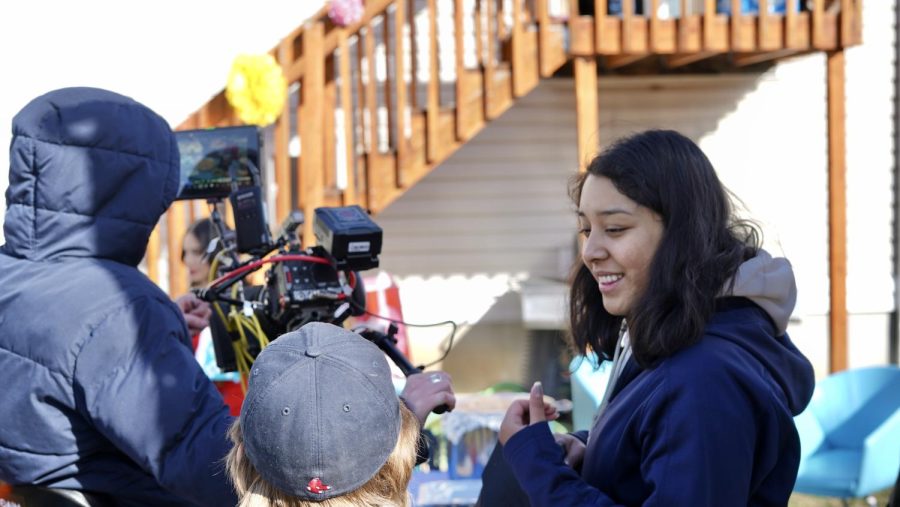Sofia Guadarrama’s Film ‘Soldout’ Explores What It Means To ‘Sell Out’ as a First-Generation Student
April 16, 2023
As a first-generation student with a love for video production, Sofia Guadarrama chose to portray her experience of assimilation, balancing cultural expectations and household dynamics in her capstone production, “Soldout.”
The film, directed by Guadarrama, a senior studying film, media arts and strategic communications at the University of Utah, follows an “enthusiastic and optimistic girl” named Ximena as she “must set aside her own pursuits for her parents and their future.”
Ximena resembles Guadarrama and her experience as a young woman in a Hispanic household navigating the unique and challenging path of being a first-generation student.
The film exceeded its $4,700 fundraising goals in 15 days, allowing Guadarrama to begin production.
Guadarrama’s parents are from Mexico and have always encouraged her to focus on her education even if it meant setting aside her own passions for creative expression. “Soldout” is a film about this predicament, which Guadarrama said is common in the lives of many students of color.
“I’ve always been interested in art, I did dance, I liked to sing and I liked to draw,” Guadarrama said. “My mom told me I could not be a dancer because you eventually get old and you know, you’re ‘useless.’ I found myself doing a lot of great things in school but my mom just wouldn’t be there because she was so busy working and trying to pay the bills.”
While going to West Valley High School, Guadarrama fell in love with the production aspect of her TV broadcasting class.
Guadarrama would develop her skills while creating freelance productions both in high school and at the U. Being the director of View from the U, a video production platform within student media, allowed her to pay for college while building her resume.
‘I sold out’
For Guadarrama, her path to the U required her to “sell out” to a community that did not best represent her.
“Growing up in Utah, I was a little bit oblivious in high school,” Guadarrama said. “Towards the end I realized a lot of systematic issues. My parents told me education is the key to all these other things but no one really talks about how hard it is with Hispanic parents, doing student government and TV West, all these other things to prove myself. I felt like I had to work twice as hard as my other peers that were white.”
Initially, Guadarrama didn’t want to go to the U after feeling disenfranchised by a community that did not represent her.
“I put myself in all these spaces that were emotionally and mentally draining because of feeling like I didn’t belong,” Guadarrama said.
“I wanted to get out of Utah, I wanted to go to film school and all these other things,” Guadarrama said. “It was twice as hard and financial aid didn’t cover most of the other schools I got accepted into. But, you know, I was able to get into the U because, you know, I sold out.”
“When I applied to the U, I didn’t get any scholarships,” Guadarrama said. “That’s why I got involved with student media and that’s been able to pay off most of my education.”
For Guadarrama, staying in Utah was a form of complacency and assimilation into a culture that did not represent her.
Guadarrama added that a mentor she had would often call her and her Hispanic peers “sellouts” for participating in the conventional college experiences.
“In college, in my first year, she would tell us to ‘stop being sellouts’ and that ‘the only thing you guys have is your community,’” Guadarrama said.
Guadarrama aims not only to tackle what it means to assimilate to Utah culture as a person of color but also to tackle a common frustration amongst Latinx students, which is the misunderstanding between immigrant parents and first-generation students.
“There’s these expectations with Hispanic families to go to school, but like, where are we gonna get the money?” she said. “I felt like I had to sell myself out to be successful. Sometimes we have to sell ourselves out to fulfill these dreams that our parents want.”
Guadarrama attempted business at the U at the advice of one of her friends who also grew up with immigrant parents. She explained that many students feel pressured to pursue more financially secure majors in order to break from generational poverty.
“A lot of POC families and students will feel guilty because they get to experience things that their families will never experience, like going abroad or trying to get a higher education,” Guadarrama said. “I see a lot of people go through higher education, they pursue these careers but they don’t really have the resources post-grad to do their best or they’re not happy, that’s something I wanna talk about [in the film].”
Rahul Barkley, a U alum who served as assistant director for the film, said, “I love working with Sofia. She brings a lot of energy to shoots and is always coming up with ideas on the spot.”
Barkley, who also worked with Guadarrama at View From the U and is the son of Indian immigrants, said films like “Soldout” are important to bring to a predominantly white community like Utah.
“I felt a strong connection to Sofia’s script,” he said. “Dealing with your own cultural identity is tough when assimilation is essential for survival all while trying not to abandon your family’s heritage.”
Narratively, Guadarrama was inspired by the films like “Lady Bird” and “Real Women Have Curves.”
Guadarrama hopes this narrative is able to shine a light on a different side of people of color and their experiences with success rather than failure.
“I feel like every time there’s narratives about people of color it’s always negative, like slavery or deportation,” Guadarrama said. “No one ever talks about post-grad and how to navigate these spaces, what goes on at home and all these frustrations.”
“Soldout” has finished production and Guadarrama plans to release the film at the end of April.








